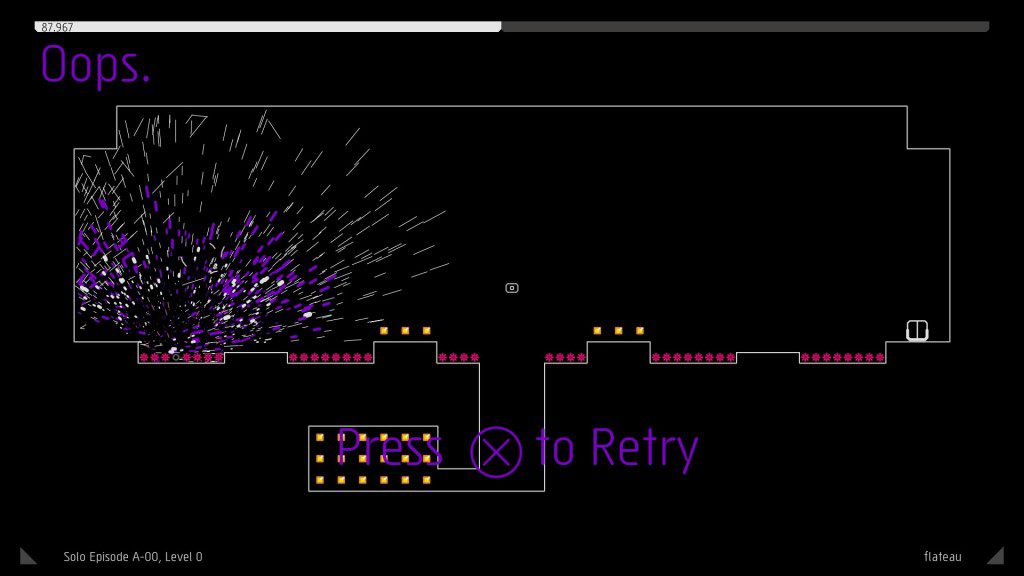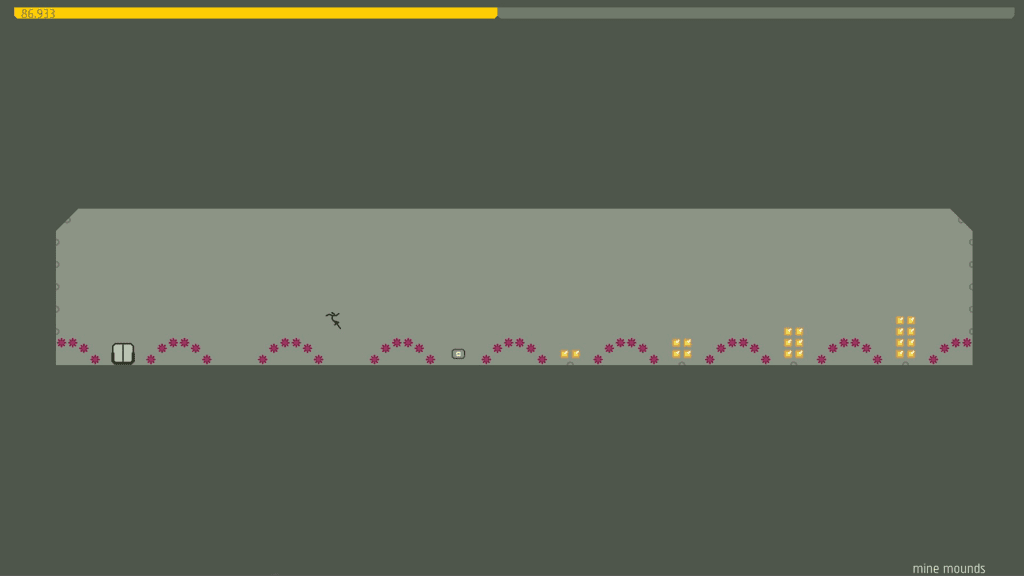Reluctantly tapping my fingers across a keyboard awash with the dirt and decay of a thousand previous typists, I hit an errant jump and meet my demise, my severed appendages coating the monochrome room and coming to rest in each of its furthest corners. Maybe next time I should avoid the gold and just reach the end intact? Maybe my mind has been sufficiently numbed following a morning spent grappling with spreadsheet formulae? It didn’t really matter, for I’d go again and again regardless.
The original N was a champion of the procrastinators. For with a certain humorous inevitability, ICT classes throughout my school would each slowly succumb to the ‘Way of the Ninja’, text documents and notation pages eventually giving way to grey stages filled with smatterings of gold and an abundance of liquid red. The more you failed the more aggressively you struck the keys to reload the level, the flow of near-success and abrupt failure a hard one to break. Metanet’s introduction to N left me feeling powerless, trapped as I was in its hollow corridors and broad hangers, dying a death painfully exacerbated by each missed jump and every sudden halt. Bringing a friend to occupy the other half of the keyboard only sought to infect another with my frustration, each of us given little time to ponder our defeat amidst a haze of restarts and reassurances.
The very first iteration of N leant heavily on this flow-state, on emphasising the repetition of stages for the sake of acquiring a few more gold pieces and a slightly better time. Its successor, N+, would promote the very same ideals. The environments of N+ were a little more detailed, the enemies a little more varied and the stages a little more refined. Still present at its heart though was the integral use of momentum, of breezing through stages with perfectly timed jumps across every angular void, and of chalking off episodes in bulk without so much as a pause for breath.
N++ arrives after two and a half years worth of development, but with almost a decade worth of source material to derive from. This is the third and final iteration of the platforming purist, and the game that represents the conclusion to a journey that began in front of a grotty CRT monitor, but will finish beneath the soft glow of an LCD television. N++ is Metanet’s opus, a colourful, crisp and unshakeably addictive platformer born of the very same fires that first gave life to its flash-based precursor.
The flat aesthetic design that has characterised each title in the series returns in N++, the many lines and vertices that make up each level being cleaner and more striking than ever. Gone are the greyscale rooms for which to live and die in, this time replaced by one of many colour palettes that are completely interchangeable at your own will. Should the classic dull colours of the previous titles not interest you, then you can switch to either an assaulting hot pink, an enticing cool blue or a neon black and purple, with each colour connoting a different mood and tone. The colour shifts can also change the circumstances that surround your impending death, with red entrails replaced by a yellowed explosion or even a plume of violet coloured fireworks. It isn’t much of a consolation should you perish in either a blue void or a green eruption, but it undoubtedly gives much more visual character to a game that leans so heavily on simplicity.
EVERY LEVEL IS A DIFFERENT DANCE. DEATH IS JUST A RHYTHM.
And it’s simplicity that has remained one of the series most ardently championed themes. N has always been about leanness, about platforming along a course constructed of only the most absolute necessities and with only the lightest touch. This style may have changed visually as the aesthetics inevitably evolve, but the ethos behind N’s platforming purity remains completely unscathed. Sparse levels are still rife with danger at every angle, be it from the charge of an electrified droid or a sobering free-fall following a mistimed jump. And whereas the initial glance at an upcoming stage may be daunting, N’s design is such that every single curve and pixel in place has a purpose. Community-made levels may delve a little deeper in terms of excess, but of the 2,000+ stages you have at your fingertips from the get-go, each presents a unique challenge, and each is made to a very exact specification.
As with previous N titles, it can be very easy to get lost within N++. The levels may by simplistic and the objective never-changing, but the aforementioned momentum at the games heart makes it difficult to pause, especially when decent progress is being made. The inclusion of a dedicated soundtrack in N++ perfectly accents the games steady flow, levels and songs alike blurring into one another without ever slowing. The soundtrack of N++ encourages something of a delirium, the mellow trance and electronic strokes coating every jump and sprint in a distinctive lucidity. And when combined with many of the colour variations on offer, both the languid melody and the more upbeat tonal rhythm can drastically effect your kinesis.
Despite its reserved presentation though, there’s a lot of depth at the core of N++. By contrast, N+ threw you into the mix headfirst, asking you to reverberate off walls and change direction in midair before you’d even learnt to walk. With N++, improvement is a lot more gradual and far more rewarding. Initial stages are designed to hold your hand as you vault mines and dance between rampaging automatons, the game eventually casting you out into the world beyond a smarter, faster ninja. There’s no visible gauge to measure yourself against, either. Progression in N is determined by your own sense of self improvement, and by how much strain you’re willing to put yourself through in order to make it to the door at the levels end in one piece. But once you do make it through that door, you’ll revert right back to the beginning anyway, if just to collect that single missed sliver of gold or to shave a few extra seconds off your time. For just like gold pieces extend the lifespan of the ailing ninja, so does the never-ending pursuit of a challenge fuel the N++ experience.
It’s that exact challenge that has kept me coming back to N time and again over the course of a decade. What started as a distraction has evolved into something of a passion, my longing for every extra second hidden behind every golden fragment leading me to run each gauntlet excessively. And N++ remains that very same game, but distilled to its truest form; a platformer that’s as stocked with character as it is decisiveness, and a definitive installment that’s as broad as it is intensely focused.

